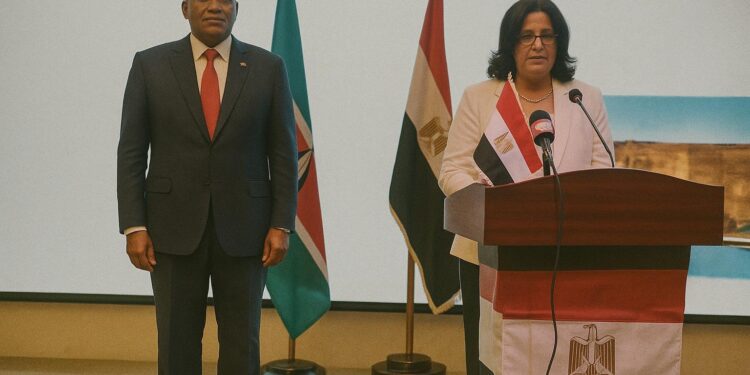Historic ties spanning six decades
When Ambassador Imane Yakout rose in Brazzaville to mark the seventy-third anniversary of Egypt’s 1952 revolution, the symbolism was not lost on seasoned diplomats in the audience. Cairo recognised Congo-Brazzaville almost immediately after its 1960 independence, weaving a tapestry of solidarity in the heyday of post-colonial activism. Archival communiqués from the first Afro-Asian People’s Solidarity Conferences show that Egyptian envoys were already speaking of ‘a shared Nilotic–Congo destiny’ (Pan-African Archives 1961). Successive Congolese leaders, including President Denis Sassou Nguesso in his first mandate, reciprocated with state visits that cemented the relationship even as Cold War alignments shifted.
Economic corridors from Cairo to Pointe-Noire
Trade flows between the two countries remain modest in absolute terms—hovering around 80 million dollars in 2023 according to the Egyptian Ministry of Trade—yet their composition reveals a forward-looking strategy. Egyptian construction firms have bid for segments of the Brazzaville–Ouesso highway, while Congolese timber cooperatives have secured preferential access to processing facilities near Alexandria. The launch of the African Continental Free Trade Area has given fresh impetus to proposals for a Cairo–Pointe-Noire maritime corridor that would shorten shipment time by a third, an idea currently under feasibility study at the African Development Bank (African Development Bank 2023).
Observers note that the economic conversation is increasingly framed in green terms. Ambassador Yakout referenced Egypt’s flagship megaprojects—El-Dabaa nuclear plant, New Alamein city and the planned Ras El Hekma smart hub—not merely as national showcases but as potential platforms for Congolese engineers and environmental planners to gain exposure to low-carbon construction standards. Brazzaville, for its part, has positioned its vast peatlands as a global carbon sink, inviting Egyptian hydrology experts to participate in measurement and verification exercises supported by the UN Environment Programme.
Security and defence learning curve
Security cooperation predates the present administrations. During the 1980s, Congolese officers attended courses at the Nasser Higher Military Academy. The contemporary iteration of that programme, rebadged under the Egyptian Agency of Partnership for Development, has expanded beyond battlefield tactics to cyber-security, maritime surveillance and counter-terrorism jurisprudence. Recent graduates interviewed in Brazzaville describe simulations designed around Gulf of Guinea piracy scenarios tailored to Congolese coastal realities.
While neither capital discloses the precise scale of armaments transfers, defence officials emphasise that the partnership is training-intensive rather than hardware-driven, thereby mitigating regional anxieties. African Union peacekeeping briefings acknowledge Egypt’s role in enhancing Congo’s capacity to police its waters, a contribution that dovetails with multilateral efforts to curb illicit trafficking in Central Africa (AU Peace and Security Council 2024).
Green growth and Vision Egypt 2030
In heralding the ‘fruits’ of Egypt’s economic reform, Ambassador Yakout echoed language found in Cairo’s Vision 2030 blueprint. That document prioritises decarbonisation, digitalisation and human-capital acceleration, areas where Congo-Brazzaville has also mapped ambitions in its National Development Plan 2022-2026. The convergence is more than rhetorical. A joint working group established last year is drafting protocols on renewable-energy certification so that Congolese hydro and solar projects can access Egypt’s nascent voluntary carbon market, launched during COP27 in Sharm el-Sheikh.
Egypt’s insistence on a dedicated Loss and Damage Fund at COP27 resonated strongly in Brazzaville, whose northern districts endure cyclical flooding of the Oubangui River. Congolese negotiators credit Cairo’s diplomatic muscle for moving climate-finance discussions ‘from polite applause to concrete pledges’, as one senior official phrased it after the Dubai COP28 closing plenary.
Continental diplomacy and multilateral leverage
Beyond bilateral files, Egypt and Congo have often aligned in continental fora. Both backed the institutional reform agenda of the African Union championed by President Paul Kagame, arguing that a leaner Commission would better serve peace-and-security missions. Cairo’s mediation credentials, sharpened through decades of shuttle diplomacy in the Israeli-Palestinian conflict, complement Brazzaville’s quiet facilitation efforts in Central African Republic talks hosted on Congolese soil. A seasoned Egyptian diplomat remarked off record that ‘Brazzaville offers moral authority in the heart of Africa, while Cairo brings convening power; together they can triangulate disputes that elude larger powers’.
The two states also share a careful pragmatism in their relations with external partners. Both maintain defence agreements with Moscow yet have diversified toward Gulf investment and Chinese infrastructure finance. Analysts at the South Centre note that such calibrated non-alignment positions them to extract concessions without antagonising major capitals.
Prospects for a balanced South–South nexus
Looking ahead, officials hint at a forthcoming framework accord that would bundle education, health and fintech cooperation under a single strategic umbrella. The document, currently circulating in ministerial drafting cells, envisages an annual Caliphate-Kongo forum alternating between Alexandria’s Bibliotheca Alexandrina and Brazzaville’s Palais des Congrès, with side events for start-ups and think tanks.
For President Denis Sassou Nguesso, whose administration seeks to diversify economic partners while retaining strategic autonomy, the Egyptian connection offers a middle path between traditional Francophone channels and newer Asian entrants. Cairo, for its part, gains an interlocutor in Central Africa able to amplify its continental voice beyond the Arab world. As the diplomats exchanged toasts under Brazzaville’s humid July sky, the unspoken message was that South–South cooperation has matured from ideological slogan to pragmatic statecraft—one where pharaonic ambition meets equatorial resilience.












































